- Published on
How to Automate Code Reviews with Gemini and GitHub Actions
- Authors

- Name
- Gustavo Kuze
- About
- About the author
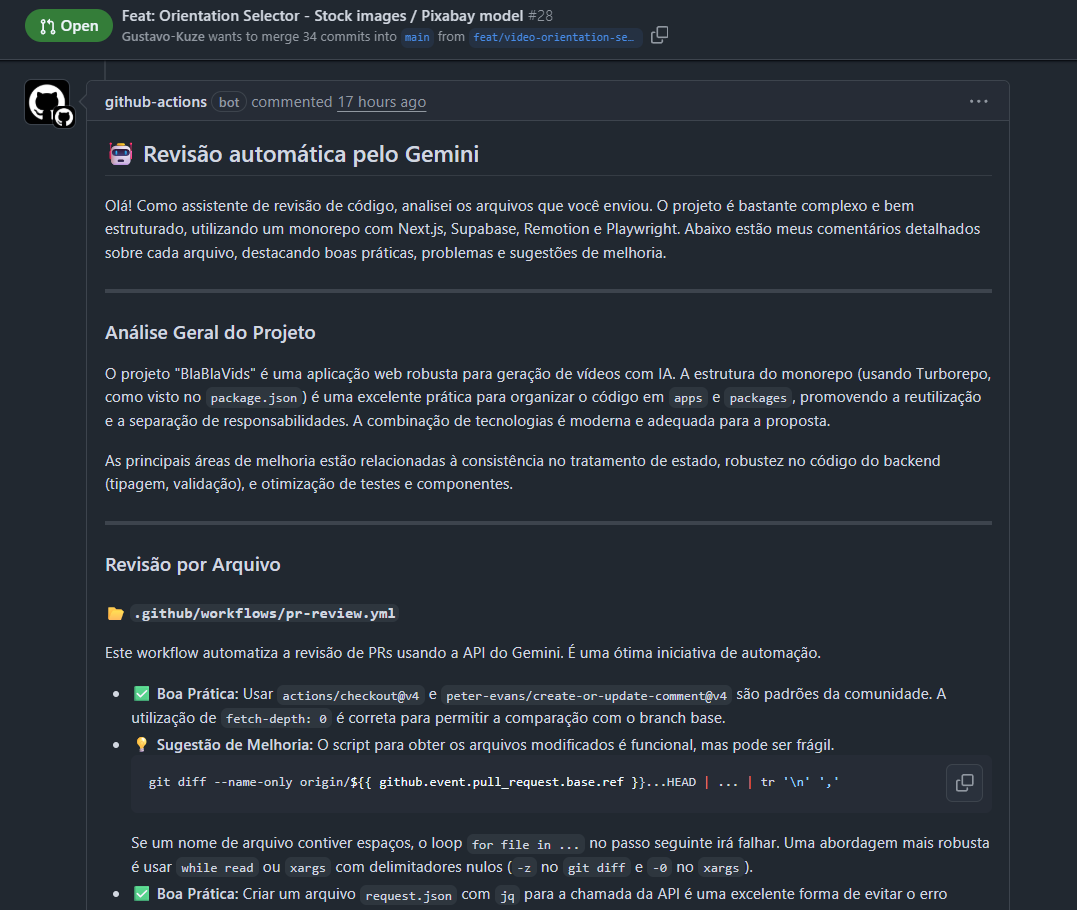
Introduction
You've probably heard of tools like Code Rabbit, What the Diff, and the newest Cursor's BugBot that perform AI-powered code reviews on pull requests, right? But have you ever wondered how they work under the hood? Well, I have, and in this article, I'll show you how to create a workflow to automatically review your PRs simply by adding a label to them.
What we'll create
We'll create a GitHub Action that:
- Is triggered when an
ai-reviewlabel is added to the PR - Reads the modified files (code "diff")
- Sends the content to the Gemini API with a prompt requesting code review
- Automatically comments the AI's result on the pull request
Prerequisites
Before we start, you'll need:
- A GitHub repository with an open PR for testing
- Access to Google AI Studio to generate a Gemini API key
- Permissions to create secrets and configure workflows in your repository
- A pair of scissors without a point (just kidding)
Setting up access and secrets
Getting the Gemini API key
Before configuring the secret on GitHub, you need to obtain your API key from Google AI Studio:
Go to Google AI Studio
Sign in with your Google account
Click "Get API key" in the top right corner
Select "Create API key" to generate a new key
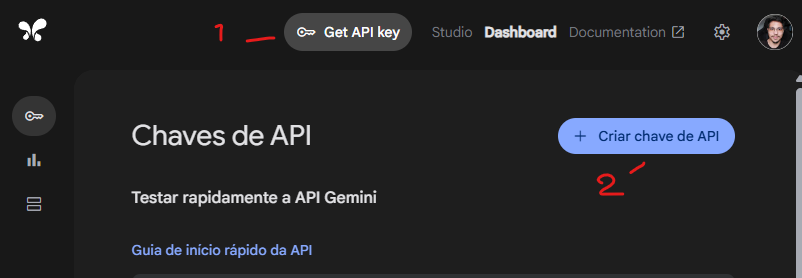
Copy the generated key (it will only be displayed once)
Save this key in a secure location - you'll need it for the next step
Creating the GEMINI_API_KEY Secret on GitHub
- Go to your repository on GitHub
- Navigate to Settings > Secrets and variables > Actions
- Click "New repository secret"
- Name:
GEMINI_API_KEY - Value: paste the API key you copied in the previous step
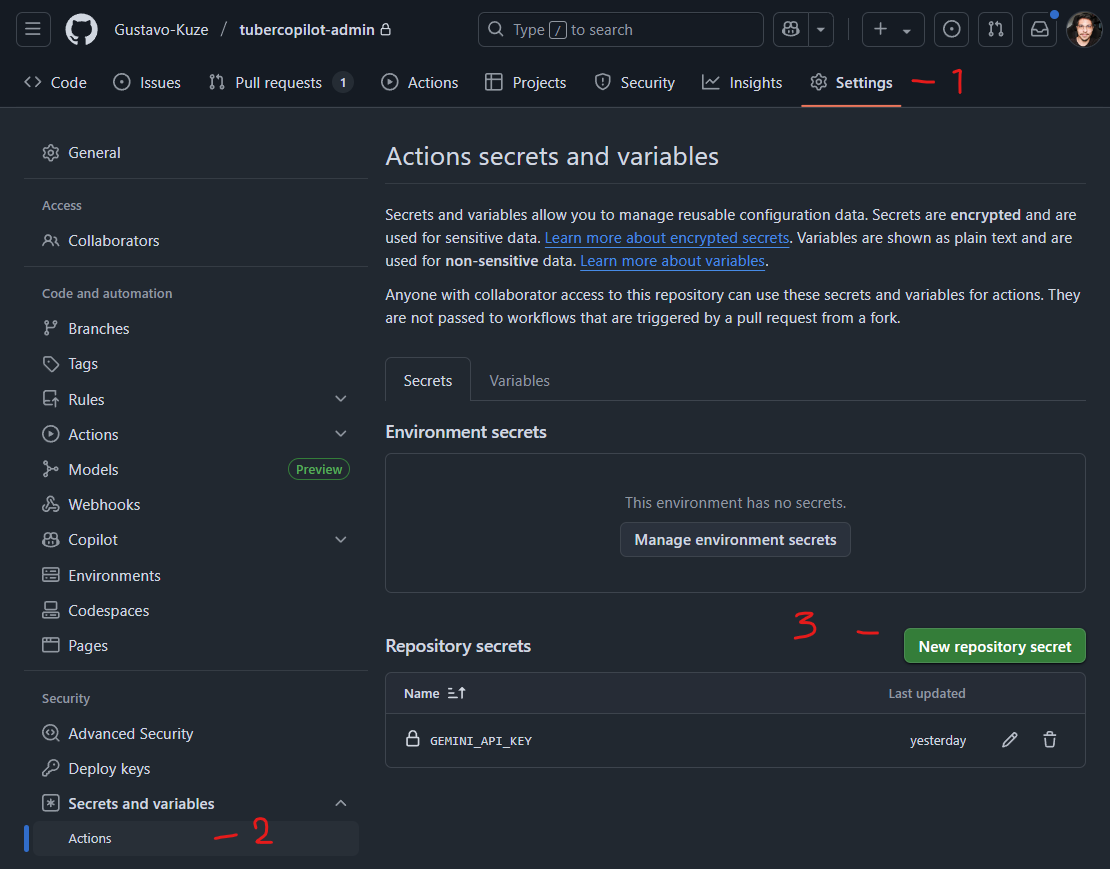
Creating the GitHub Action
Let's build the workflow step by step. First, create a new file in your repository:
.github/workflows/ai-review.yml
Step 1: Configuring the trigger
We start by defining when our action should run. We want it to run only when a specific label is added to the PR:
name: Review Pull Request with Gemini
on:
pull_request:
types: [labeled] # Only trigger when labels are added
jobs:
review:
runs-on: ubuntu-latest
if: github.event.label.name == 'ai-review'
Explanation:
types: [labeled]- The action only runs when a label is added (not when the PR is created)if: github.event.label.name == 'ai-review'- Only runs if the label is exactlyai-review
Step 2: Checking out the code
We need to download the PR code to analyze it:
steps:
- name: Checkout PR code
uses: actions/checkout@v4
with:
fetch-depth: 0
Explanation:
fetch-depth: 0- Downloads the entire git history so we can compare with the base branch
Step 3: Identifying modified files
Now let's find out which files were changed in the PR:
- name: Get changed files
id: files
run: |
# Fetch the base branch (usually main or master)
git fetch origin ${{ github.event.pull_request.base.ref }}
# Get changed files between base branch and current PR
echo "CHANGED_FILES=$(git diff --name-only origin/${{ github.event.pull_request.base.ref }}...HEAD | grep '\.js\|\.ts\|\.tsx\|\.md\|\.css\|\.json\|\.yml\|\.yaml\|\.sh\|\.md' | tr '\n' ',' | sed 's/,$//')" >> $GITHUB_OUTPUT
Explanation:
git diff --name-only- Lists only the names of modified filesgrep- Filters only code/text files (excluding images, binaries, etc.)tr '\n' ','- Converts line breaks to commas for easier processing
Step 4: Reading file contents
Let's read the content of all modified files:
- name: Read file contents
id: read
run: |
mkdir -p output
CHANGED_FILES="${{ steps.files.outputs.CHANGED_FILES }}"
if [ -z "$CHANGED_FILES" ]; then
echo "No changed files found" > output/combined.txt
else
for file in $(echo "$CHANGED_FILES" | tr ',' '\n'); do
if [ -f "$file" ]; then
echo ">>>>> $file" >> output/combined.txt
cat "$file" >> output/combined.txt
echo -e "\n\n" >> output/combined.txt
fi
done
fi
Explanation:
- We create a
combined.txtfile with all the modified code (the entire diff) - Each file is preceded by
>>>>> filenamefor identification - If there are no modified files, we create an empty file
Step 5: Sending to Gemini API
Now the most interesting part - let's send the code to the AI for analysis:
- name: Send to Gemini API
id: gemini
if: steps.files.outputs.CHANGED_FILES != ''
env:
GEMINI_API_KEY: ${{ secrets.GEMINI_API_KEY }}
run: |
jq -n \
--arg prompt "You are an assistant that performs code reviews. Given the code below, comment on improvements, issues, or best practices that apply. Code:" \
--rawfile code output/combined.txt \
'{
"contents": [{
"parts": [{
"text": ($prompt + "\n\n" + $code)
}]
}]
}' > request.json
# Make the API request using the JSON file
RESPONSE=$(curl -s -X POST "https://generativelanguage.googleapis.com/v1beta/models/gemini-2.5-pro:generateContent?key=${GEMINI_API_KEY}" \
-H "Content-Type: application/json" \
-d @request.json)
# Extract the review text from response
REVIEW_TEXT=$(echo "$RESPONSE" | jq -r '.candidates[0].content.parts[0].text // "Error processing API response"')
echo "REVIEW<<EOF" >> $GITHUB_OUTPUT
echo "$REVIEW_TEXT" >> $GITHUB_OUTPUT
echo "EOF" >> $GITHUB_OUTPUT
Explanation:
jq -n- Creates a JSON with the prompt and codejq -r- Extracts the text from the AI responseREVIEW<<EOF- Saves the result in a GitHub Actions output variable
Step 6: Commenting on the PR
Finally, let's post the analysis result on the pull request itself:
- name: Comment on PR
if: steps.files.outputs.CHANGED_FILES != ''
uses: peter-evans/create-or-update-comment@v4
with:
token: ${{ secrets.GITHUB_TOKEN }}
issue-number: ${{ github.event.pull_request.number }}
body: |
🤖 **Gemini Code Review**
---
${{ steps.gemini.outputs.REVIEW }}
Explanation:
- Uses the
peter-evans/create-or-update-commentaction to comment on the PR. Check out the documentation for more details. ${{ secrets.GITHUB_TOKEN }}- Automatic GitHub token for authentication${{ github.event.pull_request.number }}- Current PR number
Complete file
Here's the complete file you should save as .github/workflows/ai-review.yml:
name: Review Pull Request with Gemini
on:
pull_request:
types: [labeled] # Only trigger when labels are added
jobs:
review:
runs-on: ubuntu-latest
if: github.event.label.name == 'ai-review'
steps:
- name: Checkout PR code
uses: actions/checkout@v4
with:
fetch-depth: 0
- name: Get changed files
id: files
run: |
# Fetch the base branch (usually main or master)
git fetch origin ${{ github.event.pull_request.base.ref }}
# Get changed files between base branch and current PR
echo "CHANGED_FILES=$(git diff --name-only origin/${{ github.event.pull_request.base.ref }}...HEAD | grep '\.js\|\.ts\|\.tsx\|\.md\|\.css\|\.json\|\.yml\|\.yaml\|\.sh\|\.md' | tr '\n' ',' | sed 's/,$//')" >> $GITHUB_OUTPUT
- name: Read file contents
id: read
run: |
mkdir -p output
CHANGED_FILES="${{ steps.files.outputs.CHANGED_FILES }}"
if [ -z "$CHANGED_FILES" ]; then
echo "No changed files found" > output/combined.txt
else
for file in $(echo "$CHANGED_FILES" | tr ',' '\n'); do
if [ -f "$file" ]; then
echo ">>>>> $file" >> output/combined.txt
cat "$file" >> output/combined.txt
echo -e "\n\n" >> output/combined.txt
fi
done
fi
- name: Send to Gemini API
id: gemini
if: steps.files.outputs.CHANGED_FILES != ''
env:
GEMINI_API_KEY: ${{ secrets.GEMINI_API_KEY }}
run: |
# Create the request JSON file to avoid argument list too long error
jq -n \
--arg prompt "You are an assistant that performs code reviews. Given the code below, comment on improvements, issues, or best practices that apply. Code:" \
--rawfile code output/combined.txt \
'{
"contents": [{
"parts": [{
"text": ($prompt + "\n\n" + $code)
}]
}]
}' > request.json
# Make the API request using the JSON file
RESPONSE=$(curl -s -X POST "https://generativelanguage.googleapis.com/v1beta/models/gemini-2.5-pro:generateContent?key=${GEMINI_API_KEY}" \
-H "Content-Type: application/json" \
-d @request.json)
# Extract the review text from response
REVIEW_TEXT=$(echo "$RESPONSE" | jq -r '.candidates[0].content.parts[0].text // "Error processing API response"')
echo "REVIEW<<EOF" >> $GITHUB_OUTPUT
echo "$REVIEW_TEXT" >> $GITHUB_OUTPUT
echo "EOF" >> $GITHUB_OUTPUT
- name: Comment on PR
if: steps.files.outputs.CHANGED_FILES != ''
uses: peter-evans/create-or-update-comment@v4
with:
token: ${{ secrets.GITHUB_TOKEN }}
issue-number: ${{ github.event.pull_request.number }}
body: |
🤖 **Gemini Code Review**
---
${{ steps.gemini.outputs.REVIEW }}
Let's test it
- Go to the GitHub labels editing page
https://github.com/YOUR-USERNAME/YOUR-PROJECT/issues/labels
- Create the "ai-review" label
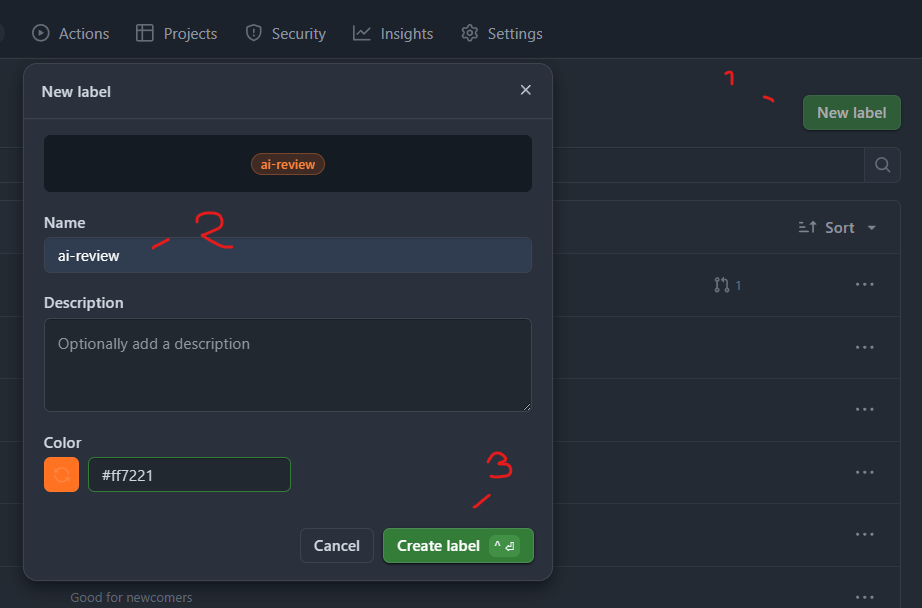
- Go to the PR on GitHub
- Add the "ai-review" label to your PR
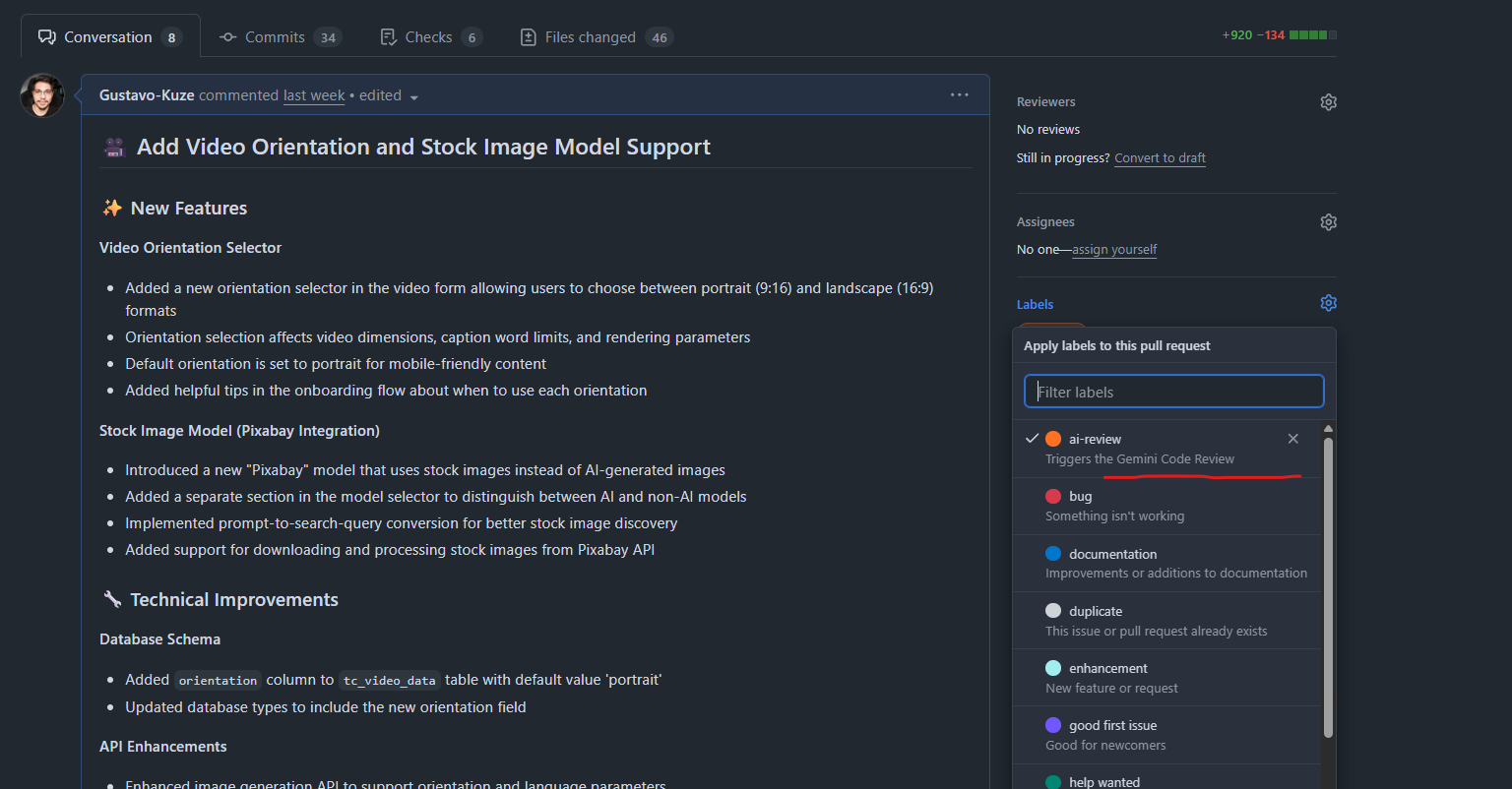
- The Action will be triggered and, in a few moments, a comment with the AI review will appear on your PR

From there, whenever you need the review to be redone, just remove and re-add the label.
Tips and customizations
- You can adjust the prompt sent to Gemini to focus on security, performance, or specific patterns
- To avoid unnecessary calls, limit the files analyzed by extension (like only
.js,.css, etc...) - Obviously the Action can be adapted to work with other AIs (Claude, GPT, Mistral...), just be careful with the credit card bill! ⚠️
- It's very easy to apply the suggested fixes by copying the PR comment and pasting it into Cursor's Cascade, without needing to enable Max Mode as is the case with BugBot
Conclusion
It's possible to integrate AI to perform code reviews directly on your GitHub without committing to another subscription on your credit card. Of course, in this case, the responsibility of iterating and improving the solution also falls on you 😅.
What we learned
In this tutorial, you learned to:
- Configure a GitHub Action that responds to specific labels
- Identify modified files in pull requests
- Integrate with the Gemini API for code analysis
- Automate comments on PRs
Next steps
Now that you have the basics working, you can try:
- Customizing the prompt to focus on specific aspects of your project
- Adding filters for different file types
- Integrating with other AIs like Claude or GPT
- Creating specific workflows for different types of review
Useful resources
Remember: AI is a powerful tool, but it doesn't replace human review. Use it as a complement to identify potential problems and improvements, but always keep a critical eye on the code being reviewed.
Let's go! 🚀
